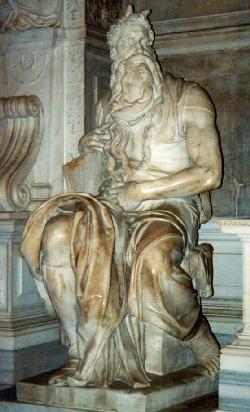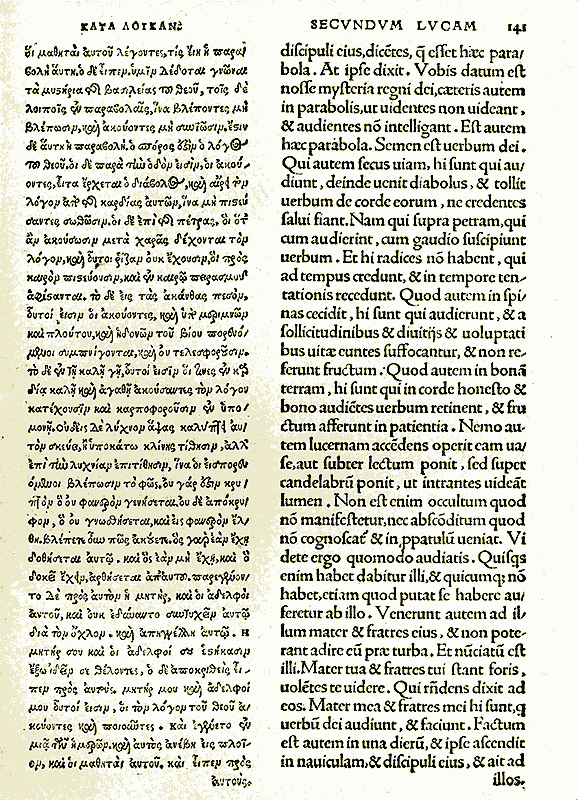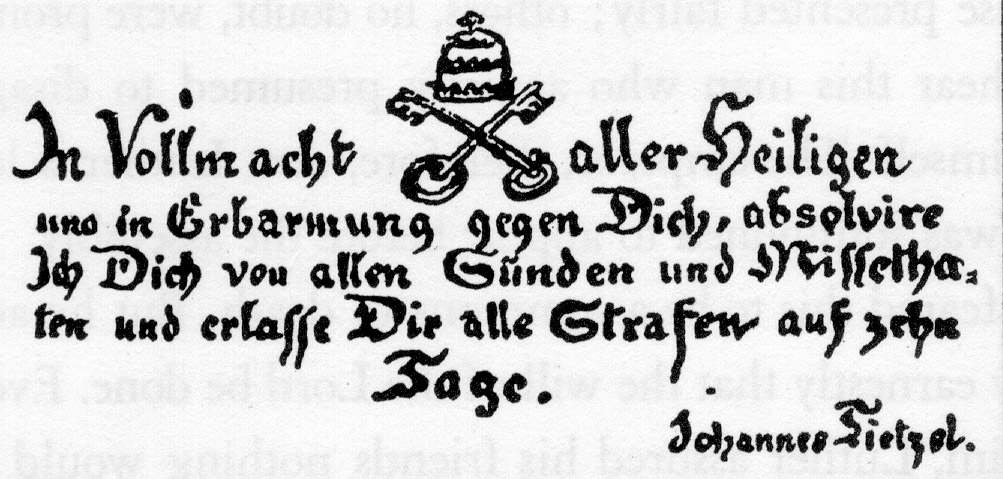1. John Wycliffe.
Wycliffe is often called the "Morningstar of the Reformation." He was born in England in 1320, studied at Oxford and later became a professor there. Wycliffe taught many topics which became central points of the Reformation: salvation not by works, predestination, priesthood of believers, the Bible as preeminent authority, rejection of indulgences, criticisms of the clergy and denial of transubstantiation. He published an English Bible in 1382, the first medieval theologian to publish a Bible in the vernacular. Up to that point, the Catholic Church used only the Latin Vulgate Bible of Jerome, completed about 382.
2. The Brethren of the Common Life, Devotio Moderna (1380-1500's)
Gerard Groote in Deventer, Netherlands, started the Brethren of the Common Life, a group of laymen devoted to religious exercises, the search for personal perfection, work, and service to others. The group founded schools of their own, and elsewhere they became teachers and headmasters of existing institutions. Some future intellectual and religious leaders were affected by this system, including Erasmus and Luther. Their most famous publication was "Imitation of Christ", possibly by Thomas a Kempis. The group was not a challenge to orthodox theology, but lived out an individualized piety.
3. John Hus (1371-1415)
Scripture translations from persecuted Waldensian refugees in Italy entered Bohemia in the 13th Century. (Peter Waldo had translated the Gospels to French in the 12th century.) The teachings of John Wycliffe had come to Bohemia as early as 1390. A close alliance had been established between England and Bohemia because England's king, Richard II, had married Anne of Bohemia, the sister of Bohemia's king. Scholars had traveled between the countries, and one eminent scholar, Jerome of Prague, had spent some time in Oxford, where he had absorbed the teachings of Wycliffe. On his return, he had spread Wycliffe's writings and teachings throughout Prague and the university.
Hus was a follower in Bohemia of Wycliffe, adopting many of his ideas : Christ, not the pope, as head of the church, the Bible as ultimate spiritual authority, he protested lax practices of the clergy, questioned transubstantiation, wrote in the vernacular (Bohemian, Czech.) Hus also questioned the existence of purgatory, rejected worship of images and ornate religious rites, condemned taking of fees by priests for religious rites. He began teaching at University of Prague in 1398 and was minister at Bethlehem Chapel there, was excommunicated in 1410, appeared before the Council of Constance in 1414 and was burned at the stake in 1415. His greatest legacy was probably his influence on later reformers. However, Hus also started a church that still exists today, the Moravian Church.
4. Invention of Printing
Shortly before 1450, Johannes Gutenberg developed a method of casting type which made it possible to produce individual metal letters that could be turned out in unlimited quantities and could be used over and over again in the printing process. He also created a new type of ink, which would adhere to the metal. For a press, he simply adapted the type of winepress that had been familiar in the Rhineland since its introduction by the Romans.
One of the first books published was the Gutenberg Bible. By 1480, printing had been carried on in over 110 European towns, and in 1500 there were 236 places where presses were in operation. By the end of the sixteenth century, the number of printed books was somewhere in the neighborhood of 140 to 200 million copies.
Religious books formed the largest category. The earliest best seller was “The Imitation of Christ”, of which the fifteenth century saw ninety-nine editions in various languages. Erasmus owed much of his influence to the press and was for a while the best-selling author in Europe until supplanted by Luther. Luther's tracts were printed in large quantities and eagerly bought, but his Bible translations had the largest sale. During his lifetime, 430 editions of his Bible or parts of it were printed. Printing was a factor of incalculable importance in the success of the Protestant Reformation. Luther, Calvin, and other leaders were gifted and prolific writers, and the press provided unprecedented facilities for spreading their gospel.
5. Renaissance Humanism
Humanism was a cultural and intellectual movement of the Renaissance that emphasized secular concerns as a result of the rediscovery and study of the literature, art, and civilization of ancient Greece and Rome. Humanist mentality stood at a point midway between medieval supernaturalism and the modern scientific and critical attitude. Humanism began as a rather pious, timid, and conservative drift away from medieval Christianity and ended in bold independence of medieval tradition. Desiderius Erasmus (1466-1536), one of the greatest humanists, occupied a position midway between extreme piety and frank secularism.
In their study of the classic literature humanists also studied the Bible and began to discover errors in the Vulgate. Some had crept in over the centuries, and some had been made by Jerome himself. Some humanists began working on new editions, in pursuit of a purer version of the Word. Some interesting errors became obvious. The present English version of Matthew 4:17, "Repent, for the kingdom of heaven is near" used the Latin word for "do penance" in the Vulgate. English versions of Luke 1:28 since 1539 have read, "Hail Mary, highly favored", or "Hail, Mary, freely beloved." The Vulgate had the questionable "Ave Maria gratia plena', which translates to "Hail Mary, full of grace", and from which came the Catholic tradition of the sinless Mary. These two errors became very important for the Reformation. A more humorous error appears in Exodus 34:29 where Moses had "horns" instead of "a shining face" or a "radiant face." Michelangelo's statue of Moses reflects this error.
When the impetus for Bible study joined with humanistic training, the result could be radical. Both Luther and Calvin had received humanistic training, and both produced vernacular translations of the Bible.
6. Desiderius Erasmus (1466-1536)
Born in Rotterdam, he attended the school of the "Brothers of the Common Life" at Deventer. On his parents' death his guardians insisted on his entering a monastery and he spent six years in the Augustinian college of Stein near Gouda. At length the Bishop of Cambrai made him his private secretary and he became an academic, teaching in Paris and England. It is said of him that "he laid the egg of the Reformation and Luther hatched it."
He remained a Catholic until the day he died. However, Erasmus was an important influence on the Reformation because he was an early and vociferous critic of the excesses of the Roman Church in the Middle Ages. He wrote a number of extremely satirical tracts, including a play ("Julius Exclusus") depicting a noted pope (Julius II) being denied entrance to heaven by St. Peter. The fact that he wasn't excommunicated until after his death is a credit to a key factor - Erasmus kept his criticisms within the clerical community (quite unlike Calvin, Luther, Knox, etc.)
In 1516, he published a Greek-Latin Parallel New Testament. The Latin part was not the corrupt Vulgate, but his own fresh rendering of the text from the more accurate and reliable Greek, which he had managed to collate from a half-dozen partial old Greek New Testament manuscripts he had acquired.
Among his key beliefs: he mocked Virgin Birth, transubstantiation, called shrines and miracles "bugbears of superstition", openly criticized the wealth and nepotism of the papacy and attacked lechery in the monastery.
7. Moral/ethical laxity of the Roman Catholic Church
Pope Alexander VI (1431-1503) was known for throwing orgies in the Vatican. He had at least four illegitimate children, one of whom was Lucrezia Borgia.
The papacy was also well known for nepotism during the 15th and early 16th century. Sixtus IV (r. 1471-1484), for example, appointed 6 nephews/grandnephews to College of Cardinals, and appointed an 8 year old boy as Archbishop of Lisbon. Leo X (the pope that excommunicated Martin Luther), appointed 6 cousins/nephews as cardinals.
Gluttony, sexual excess, avarice and other vices were common in many religious houses, to the point where monks and nuns in many areas became targets of either hatred or derision from local townspeople. It is no wonder that, when the Reformation came to countries such as Scotland and England, the local populace often joined in with the looting and destruction of the monasteries.
The church further exploited people by displaying their holy relics on church holy days. These relics included, pieces of the cross, a piece of Jesus' crib, bones of saints, Joseph's carpenter tools, a piece of the burning bush, a lock of Mary's hair, etc, etc.
The Roman Church was also known for its excessive wealth during this period. In 1502, the Catholic Church owned 75% of the money in France, and in 1522, the Catholic Church owned 50% of the wealth in Germany. In early 1500s Scotland, the Catholic church owned more than 50% of the real estate . The control of such massive wealth excited the envy of secular rulers and merchants alike, and led to the strong support of the Reformation by many secular rulers in Germany and Switzerland.
The most famous excess of the Roman Catholic Church during the period of the Reformation was the sale of indulgences. An indulgence is used to signify a remission of worldly punishment due to sin, the guilt of which has already been absolved (during Confession). Common means of gaining indulgences include prayer, fasting, giving alms, going on pilgrimages. However, in the 15th-16th centuries, indulgences were also granted for money. In 1517, Pope Leo X took things a bit further by announcing a blue light special ("feste dies" - jubilee bargain) on indulgences. Indulgences bought during this period were not just for already committed sins, but for sins not yet committed! The indulgences went to the building of St. Peter's in Rome.
Johann Tetzel, who has been described as a "medieval P.T. Barnum", sold indulgences for Pope Leo in Germany from a push cart, in a somewhat hucksterish manner. It was Tetzel's irreverent sale of indulgences which eventually led Martin Luther to tack his 95 theses on the door of Wittenberg Castle in 1517.
Footnotes and Graphics
A 1430 copy of Wycliffe's Bible, with the Lord's Prayer from Matthew 6:9 in Middle English is:
"Oure fadir that art in heuenes, halewid be thi name; thi kyndoom come to; be thi wille don in erthe as in heuene: gyue to us this dai oure breed ouer othir substaunce; and forgyue to us oure dettis, as we forgyuen to oure gettouris; and lede us not in to temptacioun, but delyuere us fro yuel."
The Gutenberg Bible :
LATIN TEXT:
ENGLISH TRANSLATION:
Michelangelo's statue of Moses with "horns"
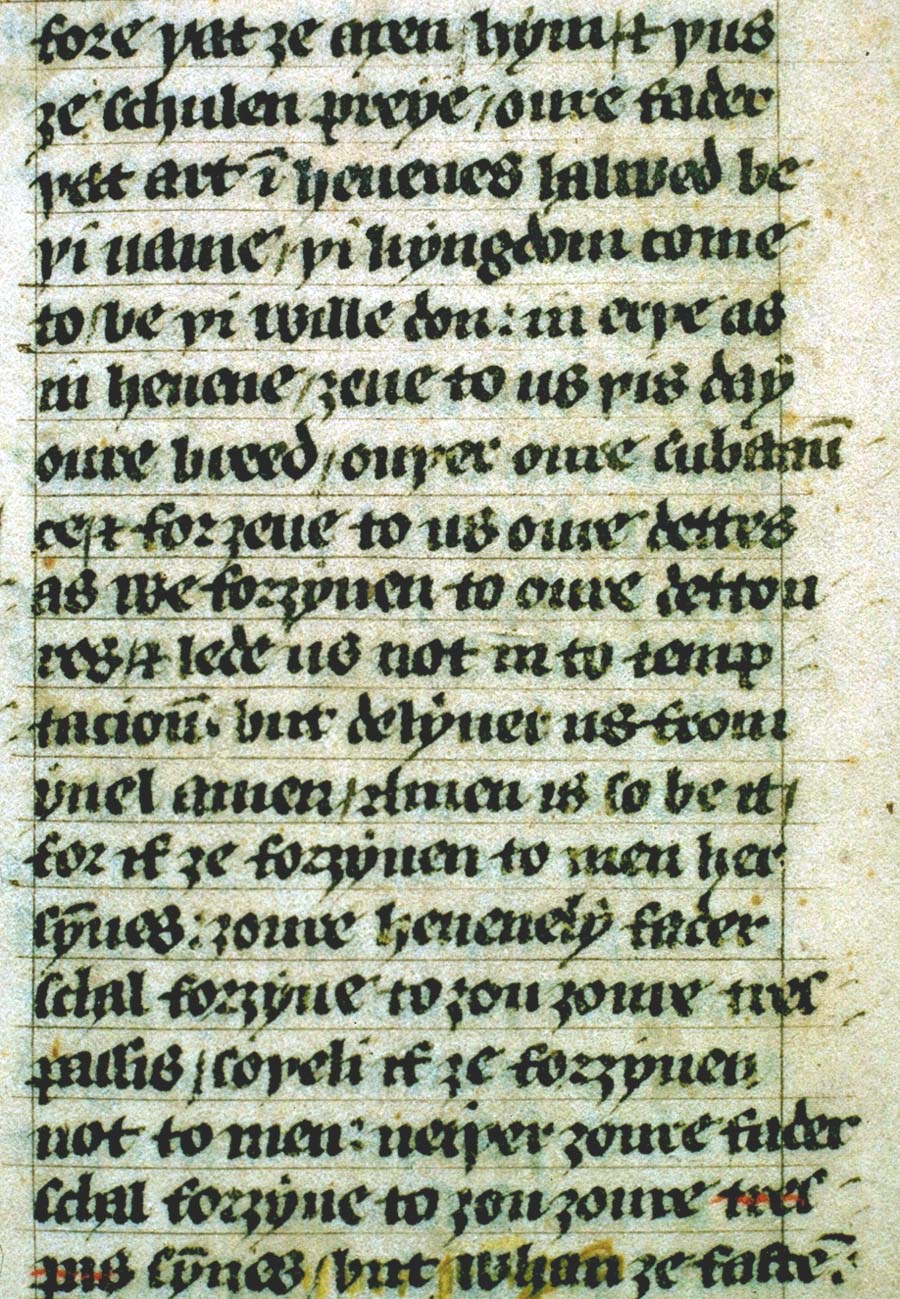
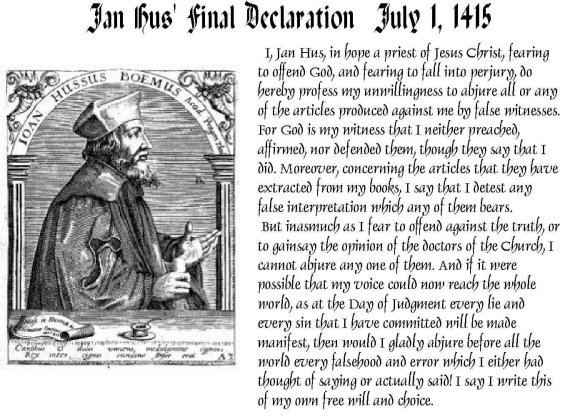
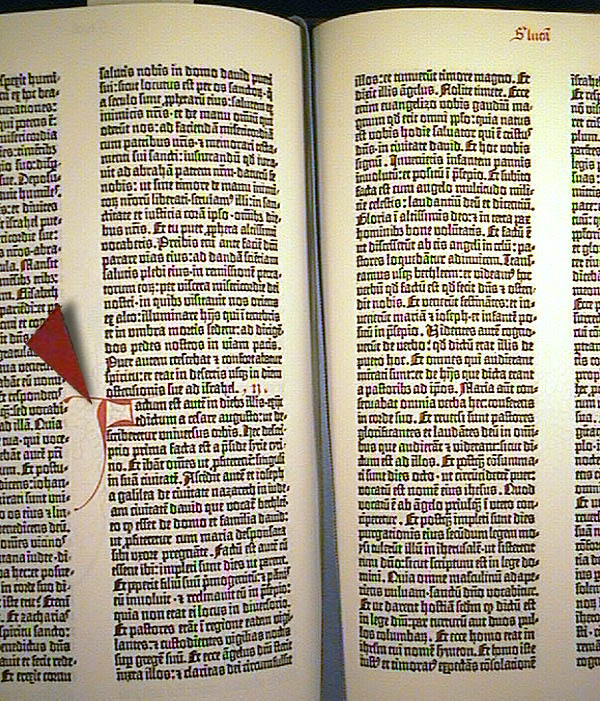
2 Factum est autem in diebus illis exiit edictum a caesare augusto ut describeretur uniuersus orbis Haec descriptio prima facta est praeside syriae cyrino
2 In those days a decree went out from Caesar Augustus that all the world should be enrolled.
